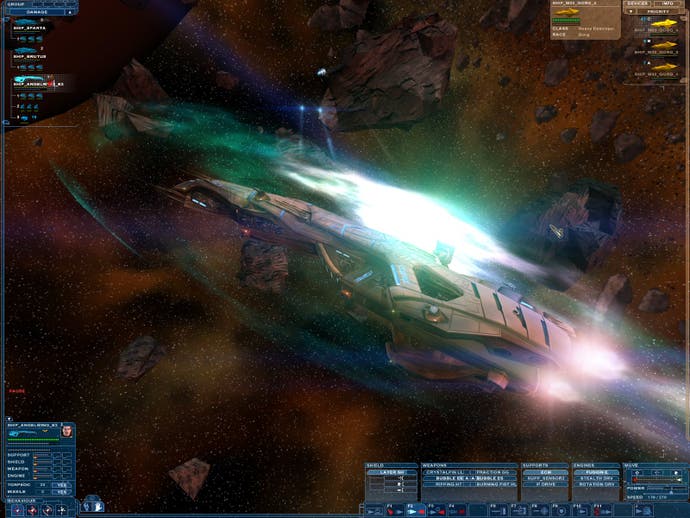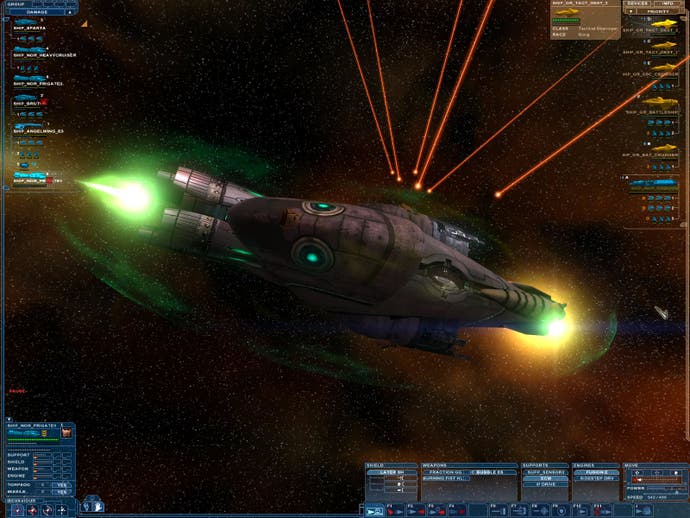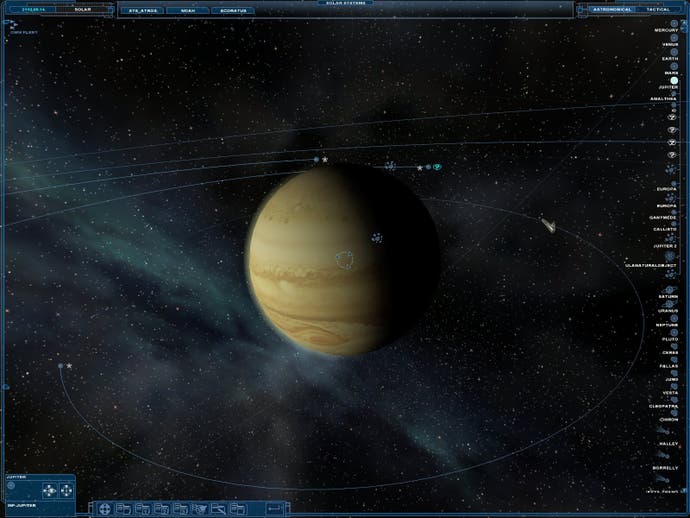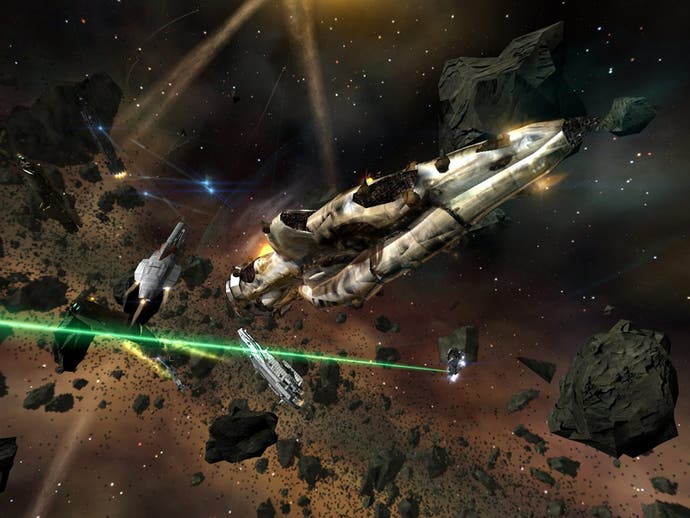Nexus - The Jupiter Incident
In space, no-one can hear Rob scream...
Space. There is, to put it mildly, rather a lot of it. It's vast, dark and cold beyond comprehension, and filled only with emptiness. And lens flare, naturally.
Space is, quite frankly, a bit of a tough sell as real estate goes, but it's certainly very good for certain things - such as playing host to epic battles between hulking metallic capital ships, darting fighters and sleek alien starfaring vessels, all tearing strips off each other with exotic combinations of beam weapons, mass drivers and lethal torpedoes.
It's a good thing, then, that Mithis decided to add the space battling element to Nexus - The Jupiter Incident, since a game focused on looking at nicely rendered asteroids, planets and, er, hard vacuum, wouldn't be very entertaining. Instead, they've delivered a game which is a science fiction fan's wet dream - filled with the aforementioned epic battles, hulking capital ships and what have you, and presented with a sense of dramatic scale that leaves other space strategy games in the moondust.
Battle of the Planets

Nexus is, in short, a space strategy simulation. I can see the comparisons with Homeworld forming in your minds already, though, and you need to nip those in the bud. Where Homeworld was effectively a real-time strategy game with the added twist of a third dimension, Nexus is all about commanding a battleship or a small fleet through engagements with the enemy and other such missions. Rather than just clicking on a point on the map and telling a unit to head over there and mine some ore or shoot some bad guys, you're effectively placed in the captain's chair, and must command the ship(s) and crew on a much more up close and personal level.
The types of battles you'll be fighting in Nexus are quite different to those found in Homeworld or indeed in the vast bulk of space warfare games. Mithis are from a school of science fiction game design which sees capital ships as great lumbering beasts which maneouvere around each other in combat, vying for the best shooting positions, while smaller fighter craft dash around in the spaces between the ships almost too fast to see. In fact, this is more like naval combat than like any space combat you may have seen before, as the lumbering ships circle each other and turrets track their targets, each captain seeking to inflict the crucial blow of the battle.
The range of control available to you might seem slightly odd at first to those unused to this style of game - which, let's face it, will be most people. Your control over the ships you command generally doesn't give you second by second input into where the ship is steered, for example - that's largely left up to the crew. However, not only can you select which enemy craft to target, but you can also select individual sub-systems on the ship to attack, thus allowing you to disable a ship's systems rather than just pounding at its hull - or, if you're feeling nasty, to disable its systems and then pound at the hull anyway. You can also choose to launch your fighters, and despatch them to meet threats from enemy squadrons or just to harass a bigger ship while you move your capital ship in for the kill, and can even launch transports of marines to board crippled enemy vessels.
Space Hulks

The whole affair is superbly presented from a user interface perspective. The control system for the game is logical and clear, with a fairly simple set of buttons arranged around the edges of the screen, leaving you free to view the action and move your viewpoint around in the middle. Helpfully, you can select units - both friendly and enemy - from lists on either side of the screen, and just about everything that needs to be done can be done from the clear menu system, so you won't find yourself rotating the view and desperately scrabbling around to find a unit you've lost in the melee. A few more context menus wouldn't have gone amiss, though - the ability to right-click on a unit and select an action would have arguably made the game easier to play - but by and large it's an interface that any strategy game player will get used to very quickly, and the game does an excellent job of gently guiding you through the first few missions to get you accustomed to it anyway.
The problem with the control system - and this is more a function of the basic gameplay than of the user interface - is that you rarely actually feel in control of the events unfolding in front of you. Certainly, your actions have a major impact on the battle, but the immediate effect of issuing orders and changing tactics is often frustratingly intangible. This is arguably a feature of this type of game, rather than a flaw with Nexus in particular, but it can be very annoying even for the seasoned strategy gamer and is worth bearing in mind. Another feature of this sort of gameplay is the tendancy for play to be reduced into a case of pausing the game (hitting space freezes the action while still allowing you to move the camera around, select units and issue orders), changing your tactics, and then unpausing the action and sitting back for a couple of minutes to see what happens. Whether you consider this aspect of play to be positive or negative is largely a personal decision, but again, it's one to bear in mind.
The game is also, quite frankly, slow. You'll spend ages watching capital ships circle as they wear down each other's health, and while it's absolutely possible to create some very satisfying tactical solutions to the various engagements which are thrown up, all too often battles come down to a question of using your units to gang up on the enemy one at a time, while fending off the rest of the opposing fleet as you pick off ships in force. It's somewhat unfair to criticise a game for failing to achieve something it doesn't really set out to do, but Nexus regularly feels like it would have benefited from a little more Homeworld-style real time strategy along with its superb space battle simulations, just to add a bit of variety to your options in battle.
The Final Frontier

One of the most impressive things about Nexus is the 3D graphics engine that Mithis has assembled for the game, and suffice it to say that the eye-candy is every bit as gorgeous as the user interface is functional - and then some. Perhaps best described as "Doom 3 in space," the engine throws around intricately modelled and bump mapped ships with realistic shadows moving over their surfaces, countless projectiles and asteroids, detailed space stations and stunning particle and weapon effects which combine to make it into one of the best-looking space games ever to grace a PC. The excellent technology isn't let down by the quality of the artwork, either. Human and alien spacecraft are fairly varied and interesting, and uniformly well designed and detailed - although the jury's out on whether the recurring resemblances to spacecraft from various other science fiction universes is homage, or rip-off.
Perhaps it's that very resemblance that makes Nexus so reminiscent, at times, of watching a TV science fiction show. It's hard to miss the fact that the first ships you'll pilot are remarkably similar to those seen in 90's cult show Babylon 5, and that comparison leads to the rapid realisation that actually, the graphics you're seeing in real-time in Nexus hold up well in comparison to the pre-rendered efforts of Babylon 5 or that era of Star Trek. The direction of the cutscenes helps; although there are a few too many random lingering shots, there's also some great camerawork here that really shows off the scale of the universe and combines with the largely excellent voiceover work to make for a pretty solid way of delivering the game's plotline.
The plotline itself is fairly unremarkable, covering territory to do with the use of alien technology by a shadowy syndicate in Earth's solar system, the wormhole your father's spaceship disappeared through when you were still a child, and other such Shocking Revelations. Perhaps we're just jaded by too much SF, but it all seemed terribly predictable, although it's competently written stuff which acceptably fills a gap between majestic space battles.
Lost in Space

Despite its unquestionably high production values, excellent graphics and keenly realised battle simulations, Nexus feels like a little bit of a disappointment. The first couple of hours of the game are fantastic, as you're introduced to the universe, the ships, the stunning battles and the interesting gameplay, but for the average strategy fan, the realisation that the game is all about increasingly complex micro-management of your ships and crew is something of a let-down.
This game will unquestionably appeal to those who enjoyed the likes of Starfleet Command, and it has plenty to offer to fans of space opera type games as well - boasting as it does a great, if sadly limited, tactical gameplay system, graphics which make Homeworld 2 look like one of Cinderella's less aesthetically pleasing siblings and the potential for some excellent multiplayer if you can hook up with some friends in-game. For most strategy gamers, though, it's a curiosity - a well-crafted, incredibly good looking curiosity, but not one that's got what it takes to hold your attention for much past the first couple of hours.

